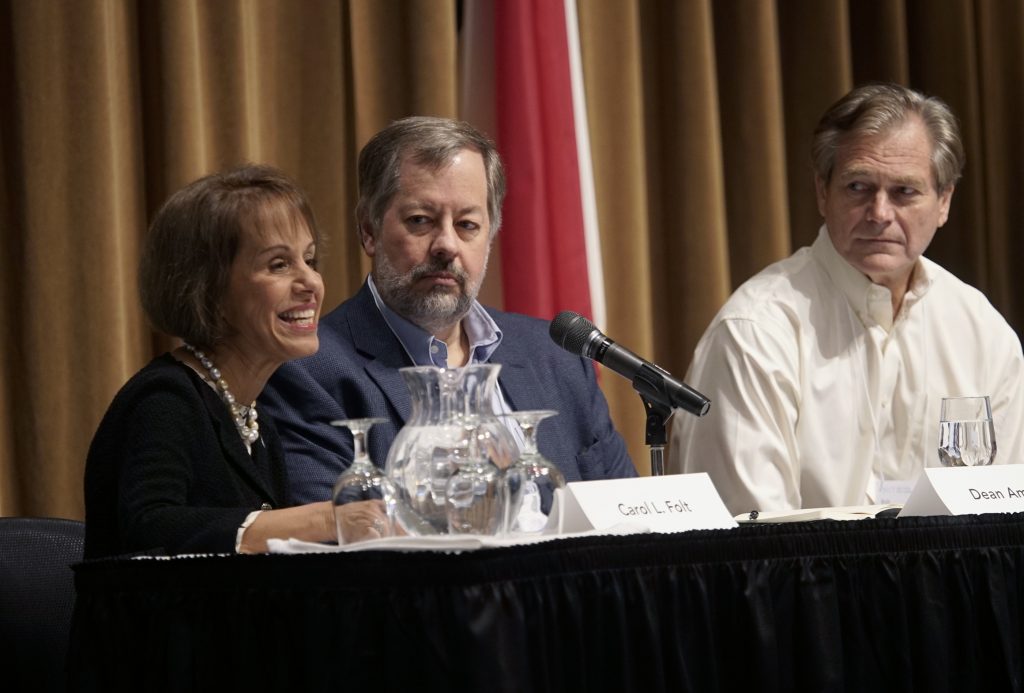Folt leads panel on public-private partnerships to enhance innovation at UNC Clean Tech Summit
March 12, 2017
Chancellor Carol L. Folt moderated the panel “Public-Private Partnerships Between Universities and the Private Sector: A Powerful Way to Advance Innovation” at the 4th annual UNC Clean Tech Summit, Mar. 2 and 3.
At the 4th Annual UNC Clean Tech Summit, Chancellor Carol L. Folt used her extensive background in education and biology to moderate a panel on ways to advance innovation through partnerships between universities and the private sector. Folt was joined by Dean Amhaus, president and CEO of The Water Council, Bob Irvin, executive director of CLT Joules, and Brewster McCracken, president and CEO of Pecan Street. The panel, directed by Folt, answered important questions about bringing businesses and universities together and the role students can play in this partnership.
Folt opened the session with an introduction of the three panelists, all of whom had expertise in the area of combining public and private partnerships in the interest of clean tech and sustainable innovation.
As Folt told the audience, during Amhaus’s seven years at the Water Council he has helped the Council grow the Milwaukee region into a water research and education hub. At CLT Joules, Irvin has worked with energy companies, universities and the entrepreneurship community in Charlotte in order to strengthen innovation and partnerships between the private and public sector. McCracken’s work at Pecan Street focuses on providing energy tracking data and research to students and universities.
Clean tech innovation and building private-public partnerships is an extremely important and growing industry, as Folt explained. “One thing I wanted to explore with you is that its one thing to have a good idea but it’s another thing to have a good outcome,” Folt said. “And I think that’s what we’re trying to figure out here, how can we bring universities and businesses together in effective ways in clean tech.” In order to combat this issue, Folt asked the panelists to speak from experience about how businesses and universities can come together to achieve a successful outcome.
Amhaus used water innovation as an example, and explained how the water tech cluster in Milwaukee was private sector and university driven. Speaking about how the water tech cluster in Milwaukee grew to 190 companies, Amhaus said, “I think that what we have seen first and foremost in our area is the private sector recognizing that the universities were key to this growth, and so we found two universities that were doing great things in water and worked with them. So in many respects we don’t separate the water technology industry as industry v. academia, we see that as one.”
Brewster used something called an agricultural extension service as an example of how Pecan Street acts as a mediator between universities and businesses to help bring about technological innovation. Brewster called agricultural extension services maybe the most successful model of applying university research to the real world to produce great positive outcomes and economic success.
“Agricultural extension services talk to farmers and ask what they need, and then they talk to big agricultural business and ask what they need,” Brewster said. “Then they go to universities and explain the challenges the real world is facing and ask if they want to pursue a solution. And when the university work is ready we’ll bring in big agriculture business who will test it out with real farmers.”
The panel wrapped up with several questions from the audience and an agreement that more can be done by both universities and the private sector to strengthen this important partnership.
